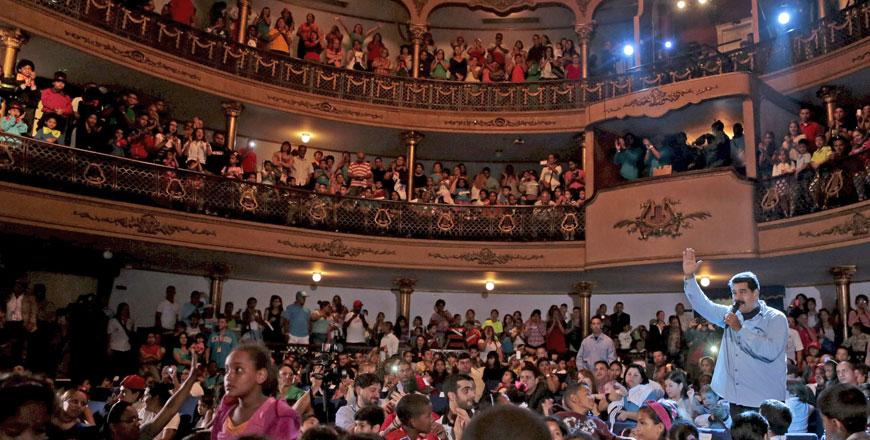You are here
Venezuela jails store owners accused of creating queues
By Reuters - Feb 02,2015 - Last updated at Feb 02,2015
CARACAS — Venezuela has jailed the owners of an unnamed chain of shops accused of engineering queues to whip up anger with the socialist government, President Nicolas Maduro said on Sunday.
Chronic shortages of basic goods, including flour, chicken and diapers, have triggered massive lines that sometimes stretch around blocks and have become a nightmare to navigate for Venezuelans.
Most economists blame the scarcity on currency controls that restrict dollars for imports, as well as falling domestic production.
Maduro, however, accuses a rapacious business elite of waging an "economic war" to bring down his administration.
"Yesterday, we detected that a famous chain of stores was conspiring, irritating the people," Maduro told a crowd of red-clad supporters and soldiers.
"We came, we normalised sales, we summoned the owners, we arrested them and they're prisoners for having provoked the people," he said to cheers, adding that the state would take over the food stores.
The stores purposefully reduced the number of cashiers to create lines, Maduro said earlier on Sunday, likening the strategy to a "guerrilla tactic”.
Authorities are also pressing charges against Venezuelan pharmacy chain Farmatodo for not opening enough check-out counters. Its executives have been summoned for questioning.
The government has jailed businessmen in the past for raising prices, and has launched several campaigns designed to combat contraband of price-controlled goods flowing to neighbouring Colombia.
"Those who use their stores to hurt the people will pay with jail time," said Maduro, donning a tracksuit with his name sewn on and a camouflage hat.
Critics say cracking down on businesses risks aggravating shortages and further deters investment.
They have also lampooned Maduro for not pushing through major structural changes to combat the country's recession, over 60 per cent inflation, and shaky finances.
Maduro, who won an election to replace his mentor, the late Hugo Chavez, in 2013, added he secretly toured the capital Caracas for four hours on Saturday with his wife and close adviser Cilia Floresto to survey the situation at stores.
Separately, a Reuters analysis shows that at least 40 major US companies have substantial exposure to Venezuela's deepening economic crisis, and could collectively be forced to take billions of dollars of write downs.
The companies, all members of the S&P 500, and including some of the biggest names in Corporate America such as autos giant General Motors (GM) and drugmaker Merck & Co. Inc., together carry at least $11 billion of monetary assets in the Venezuelan currency, the bolivar, on their books.
The official rate is at 6.3 bolivars to the dollar and there are two other rates in the government system, known as SICAD 1 and SICAD 2, at about 12 and 50. The black-market rate, though, was at about 190 bolivars to the dollar on Sunday, according to the website dolartoday.com.
The problem is that the dollar value of the assets as disclosed in many of the companies' accounts is based on either the rates at 6.3 or 12 and only a limited number of transactions are allowed at those rates.
The assets would be worth a lot fewer dollars at the 50 rate in the government system and the dollar value would almost be wiped out at the black-market rate.
The currency system is also about to be shaken up following an announcement by Maduro on January 21, leading to fears of a further devaluation.
American companies will also have additional exposure to the bolivar that isn't disclosed because they don't see the size of that exposure as material to their results.
The Reuters analysis also doesn't look at the thousands of publicly traded and private American companies that aren't in the S&P 500 and will in some cases have bolivar assets.
Black-market rate
Some leading American companies have already decided that the stronger exchange rates, the official rate at 6.3 and the SICAD 1 exchange market at 12, are not reflective of the currency conditions they face in the South American country.
Diaper and tissue maker Kimberly-Clark Corp. recently announced a charge of $462 million for its Venezuelan business, leading to a fourth-quarter loss for the company, after it concluded that the appropriate exchange rate was the SICAD 2 exchange rate at 50 rather than the 6.3 it had previously used.
Using the stronger exchange rates is unrealistic because of how hard it is to repatriate profits earned in Venezuela back to the United States at any rate, let alone those rates, securities analysts say. Citigroup Inc says it has not been able to buy US dollars from the Venezuelan government since 2008.
Companies can seek dollars at the official rate if they are using those dollars to import raw materials for production of priority goods such as food and medicine, and some can buy dollars at the SICAD 1 rate at around 12 bolivars to the dollar through auctions that are typically held several times per month but are only targeted at specific sectors.
As tumbling oil prices have left Venezuela with fewer dollars, its currency board has steadily reduced approval for repatriation of dividends at the official rate, leaving companies with growing quantities of bolivars trapped by currency controls.
"It's a huge deal and companies will get hit big," said Ali Dibadji, an analyst at Sanford C. Bernstein & Co. Inc. "Take a look at what Kimberly-Clark did last week and what Clorox did a few months ago by getting out of Venezuela."
Cleaning and household products maker Clorox last year decided to exit Venezuela altogether. Its Chief Executive Officer Don Knauss said at the time: "We saw no hope that we could create a sustaining business in that country."
The currency issues are hurting many US companies much more than their sales might suggest. Many of the companies in the analysis have been getting between 1-3 per cent of their global revenue from Venezuela.
Ford Motor Co. and oil services company Schlumberger NV took big-ticket hits to their quarterly profits because of their Venezuelan operations. Ford took a fourth-quarter charge of $800 million and Schlumberger $472 million.
A Ford spokeswoman said that it still values its Venezuela assets at about 12 bolivars per US dollar. But for Ford, the currency system and other conditions are so tough in the South American country that it has made an accounting change that will allow it to ring fence its Venezuela business so that it doesn't have a direct impact on the company's operating results.
Schlumberger, which previously used the 6.3 rate, said it is now using the SICAD 2 rate of 50 as it "best represents the economics of Schlumberger's business activity in Venezuela".
Another S&P 500 company to switch to the 50 rate from 6.3 in recent weeks was industrial gases producer Praxair Inc., which took a fourth-quarter charge of $131 million as a result. It also said the switch will hurt its revenue and earnings in 2015.
Another devaluation?
Those changes don't reflect the prospect of another currency devaluation in Venezuela, as recently telegraphed by Maduro, who is struggling to keep a lid on consumer prices amid a 64 per cent inflation rate and a plunge in oil revenue. The official rate was last devalued by 32 per cent to the current 6.3 from 4.3 in February 2013, at that time the fifth devaluation in a decade.
Maduro said in the January 21 announcement he would merge the two existing SICAD rates (the ones at 12 and 50 per US dollar). He also would introduce another new rate to offer dollars via private brokers to vie with the black-market rate. There has yet to be a further announcement providing details of the new system and the rates.
Currency uncertainties aside, foreign companies face a myriad of other problems in Venezuela, from weak demand to shortages of many goods, difficulty in importing parts and products, and relying on the government to approve price increases to keep pace with hyperinflation.
Most of the S&P 500 bolivar exposure is concentrated among 10 companies that have disclosed about $7.3 billion in assets linked to the country's currency system, according to the Reuters analysis of their latest quarterly financial statements.
But if those companies used Venezuela's SICAD 2 currency rate, the one at about 50 bolivars to the dollar, their assets would decline by as much as $5.8 billion. All of these companies currently either use the rates at 6.3 and 12.
It would be far worse if they used Venezuela's black-market rate of about 190 for the currency. The companies' bolivar assets would be worth only a tiny fraction of their current estimated value if they used that rate.
GM, which ranked No. 1 out of the group analysed, with $1.5 billion in Venezuela exposure, said it is closely monitoring conditions there. "We have nothing to announce at this time," spokesman Tom Henderson said.
Some US companies, such as Merck, justify valuing their Venezuela assets at the most preferential rate because they are providing essential services and goods, like medicine, to the country. They report some success in translating bolivars into dollars at the 6.3 rate. Merck did not respond to a message seeking comment.
Still, some of these same companies have prepared their investors for a currency hit in their latest round of quarterly disclosures. PepsiCo Inc. said it would take an after-tax charge of up to $440 million if it revalued its Venezuela assets at the 50 rate. As of early September, the company disclosed $505 million in bolivar-denominated net monetary assets.
"I do think that more companies may consider exiting Venezuela if the inability to remove cash or take prices to offset devaluations persist," said Dibadji, the Sanford Bernstein analyst.
Related Articles
CARACAS — President Nicolas Maduro has ruled out dollarising Venezuela's economy as a way to resolve the chaotic currency situation in reces
President Nicolas Maduro shook up complex currency controls on Wednesday and also prepared Venezuelans for a rise in the world's cheapest fuel prices in response to a recession worsened by plunging oil revenue.
Venezuela will repay a small part of its debt to local importers, after currency controls have sparked mass shortages of basic goods in the oil-rich country.
















